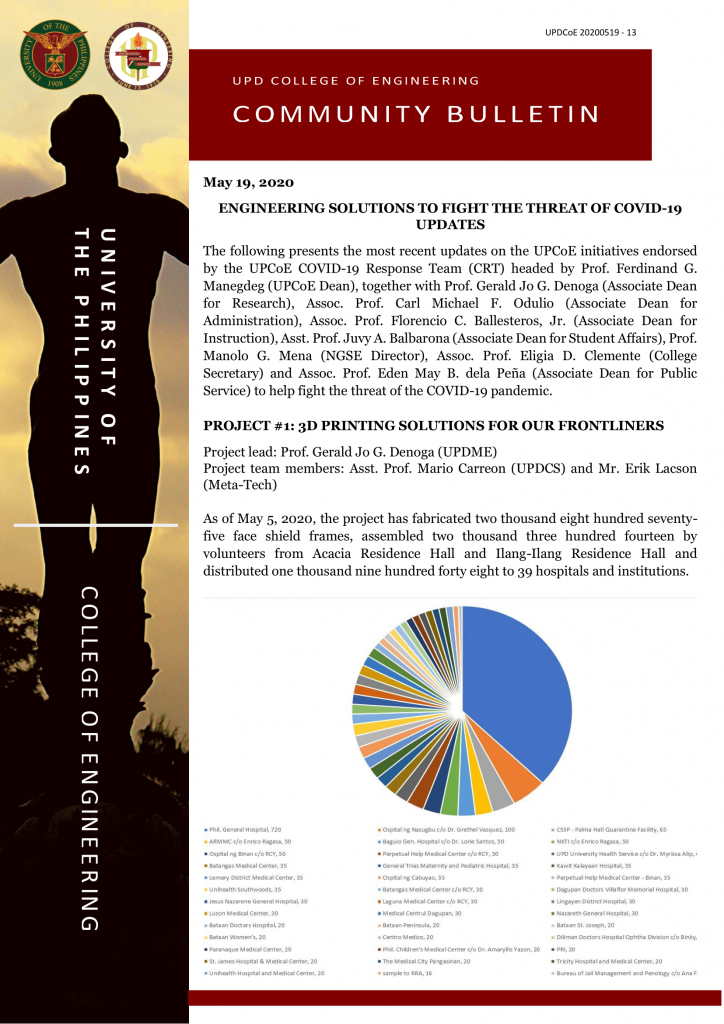
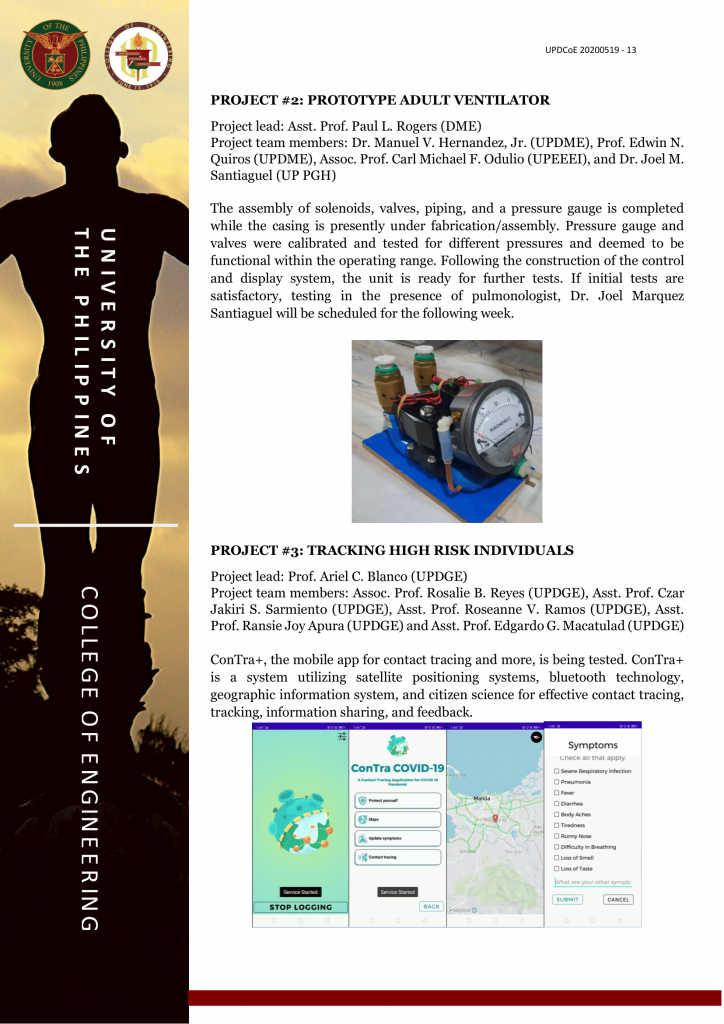
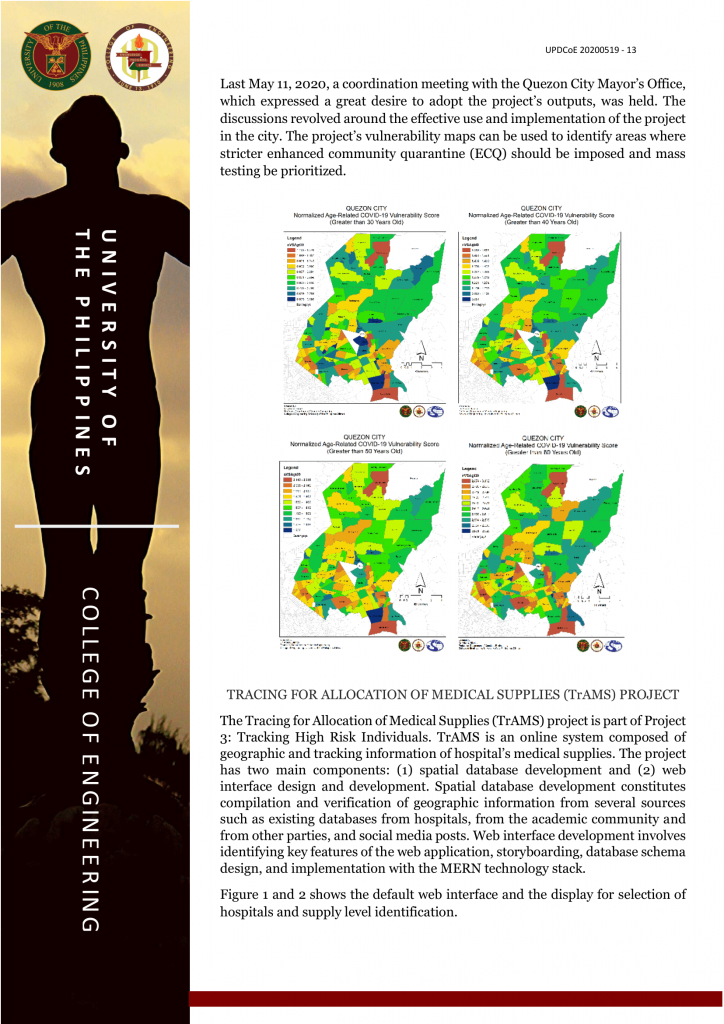
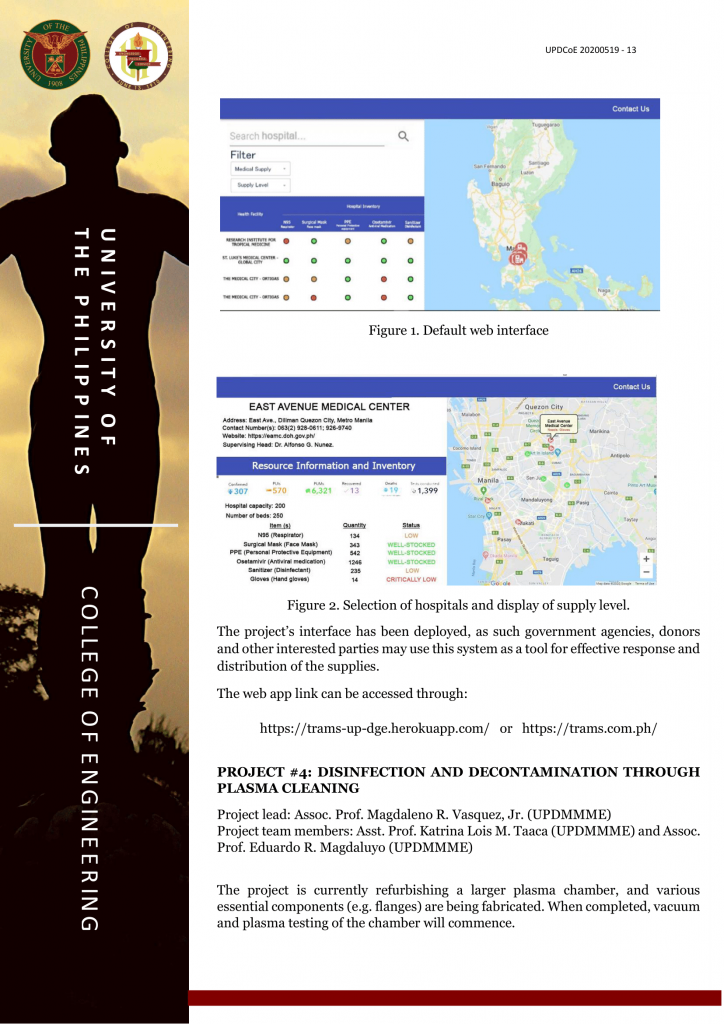
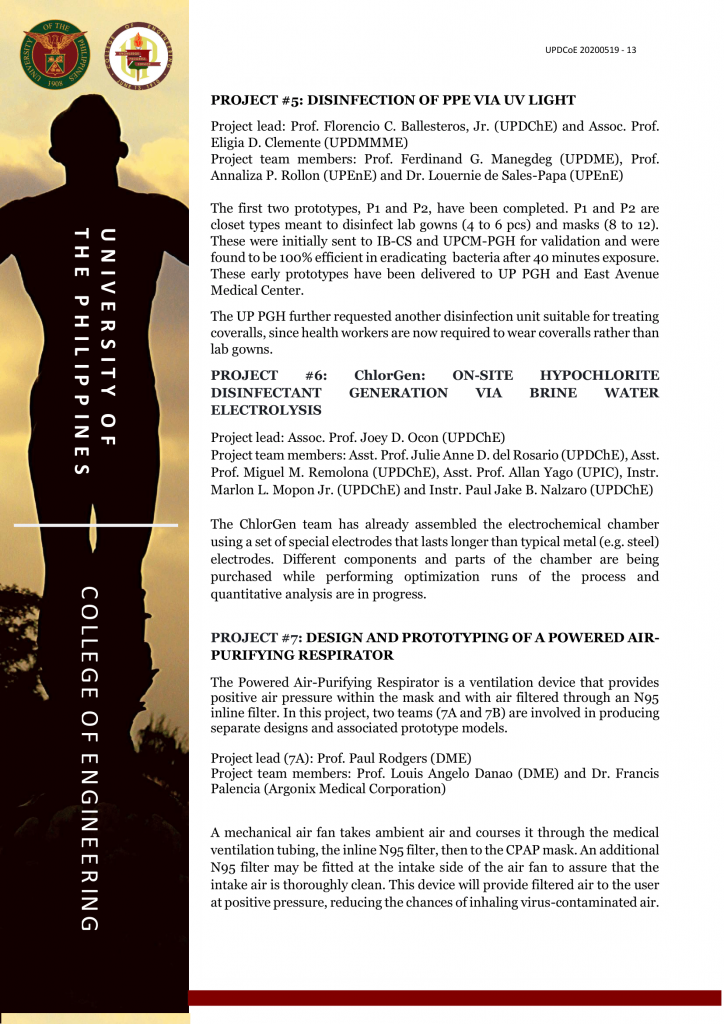
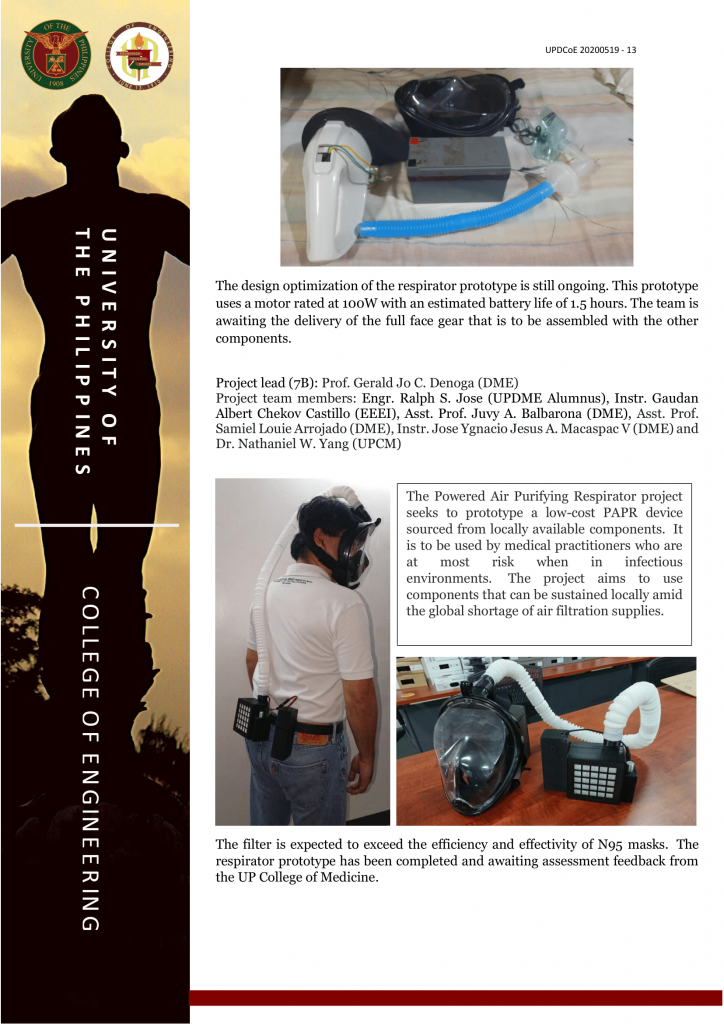
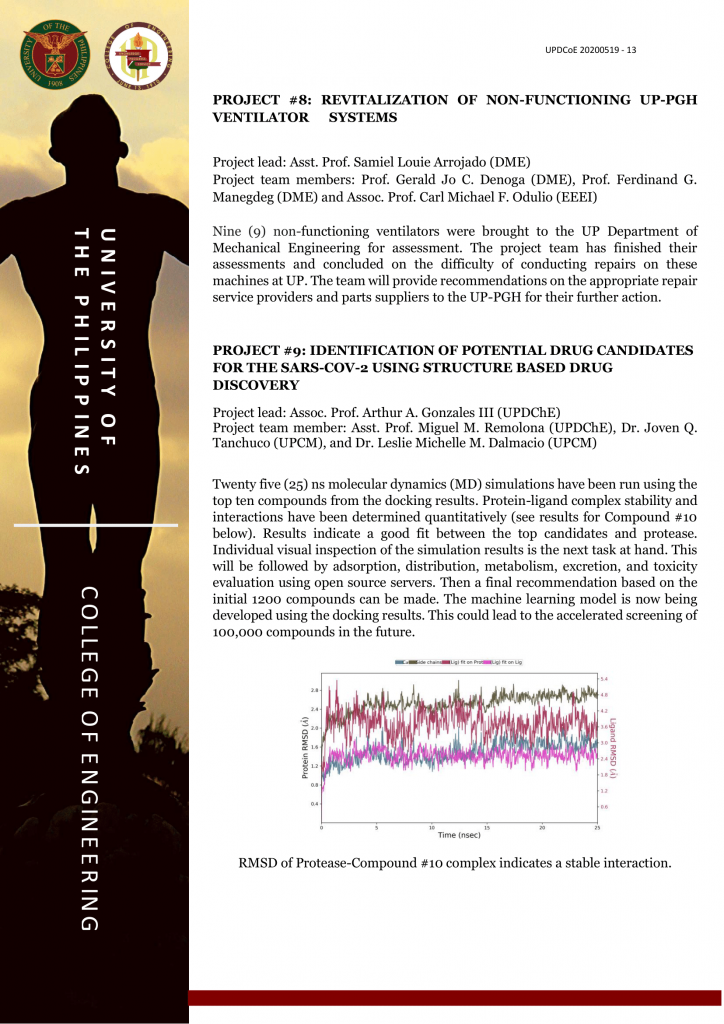
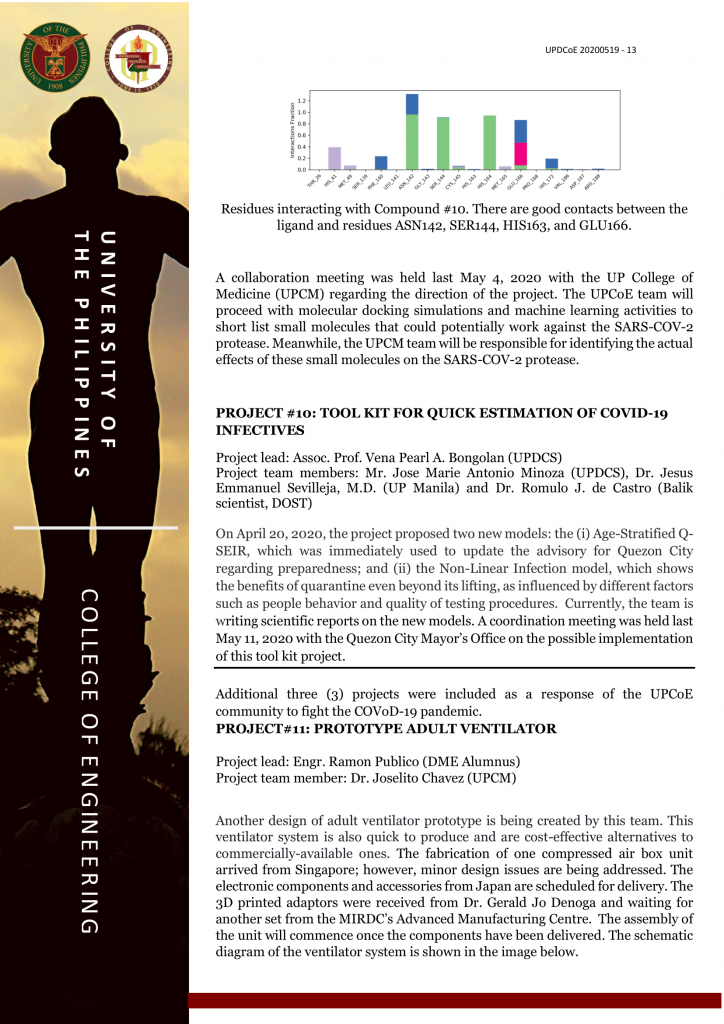
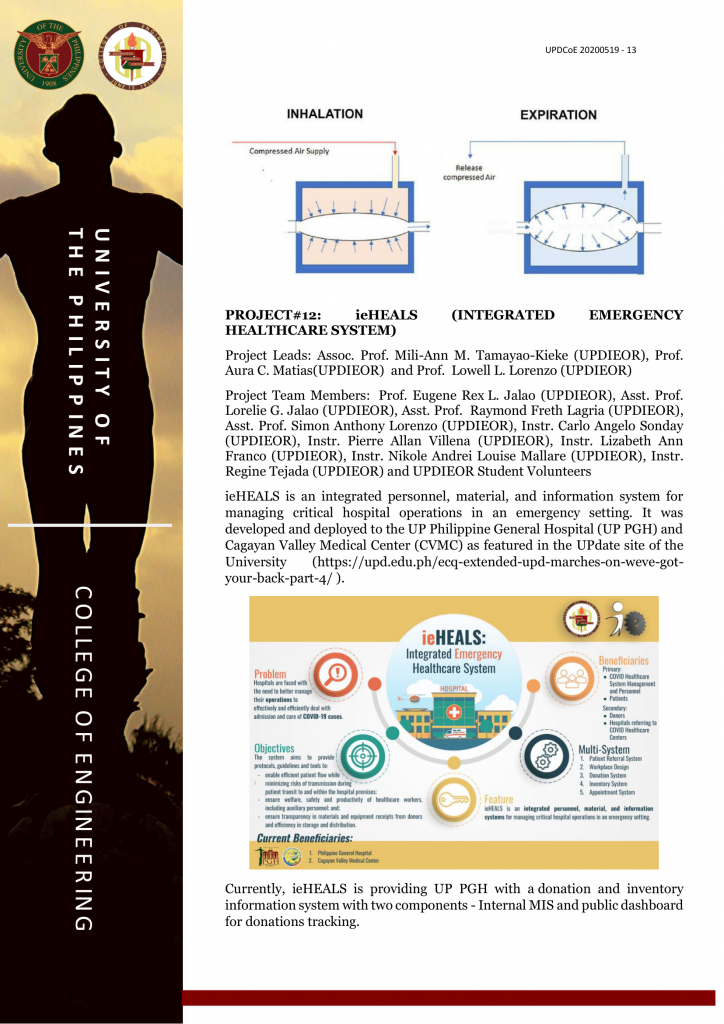
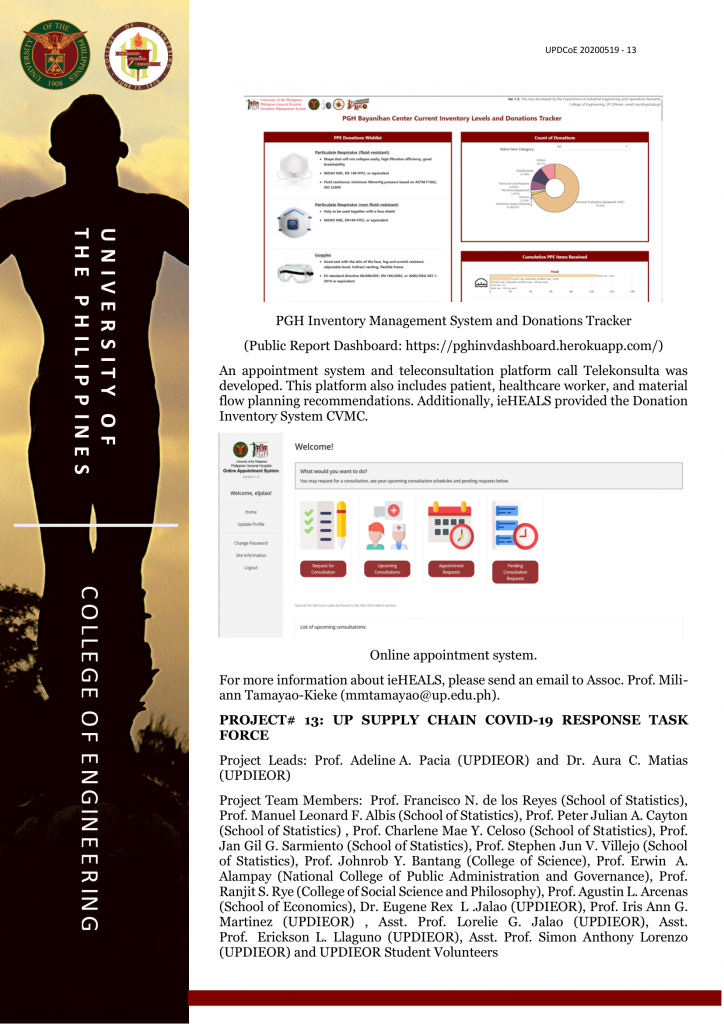
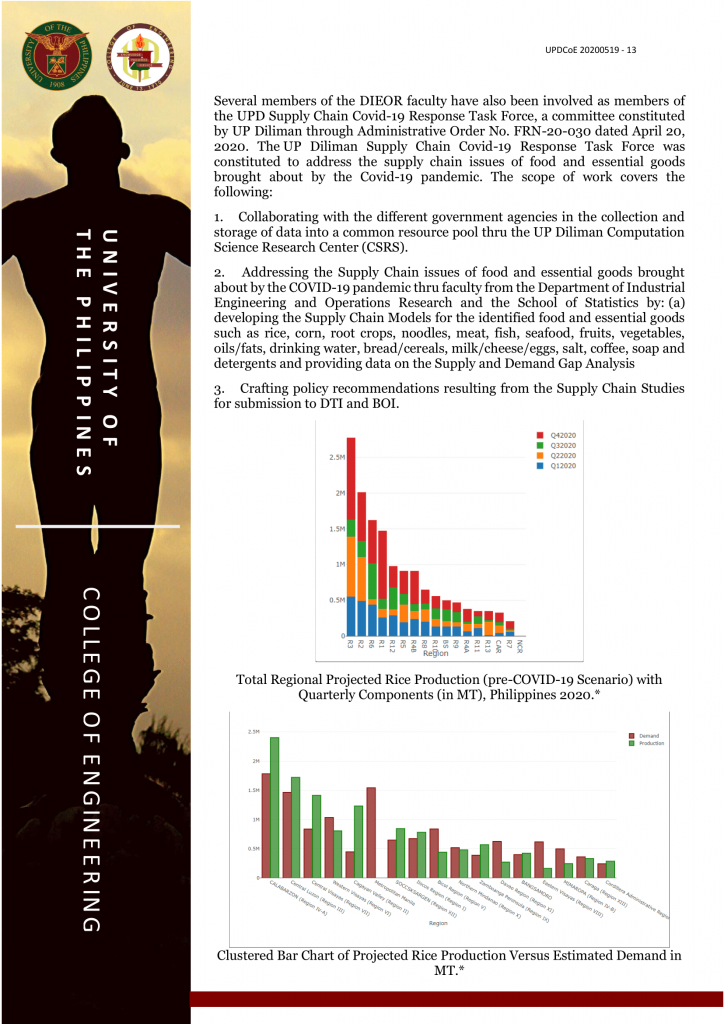
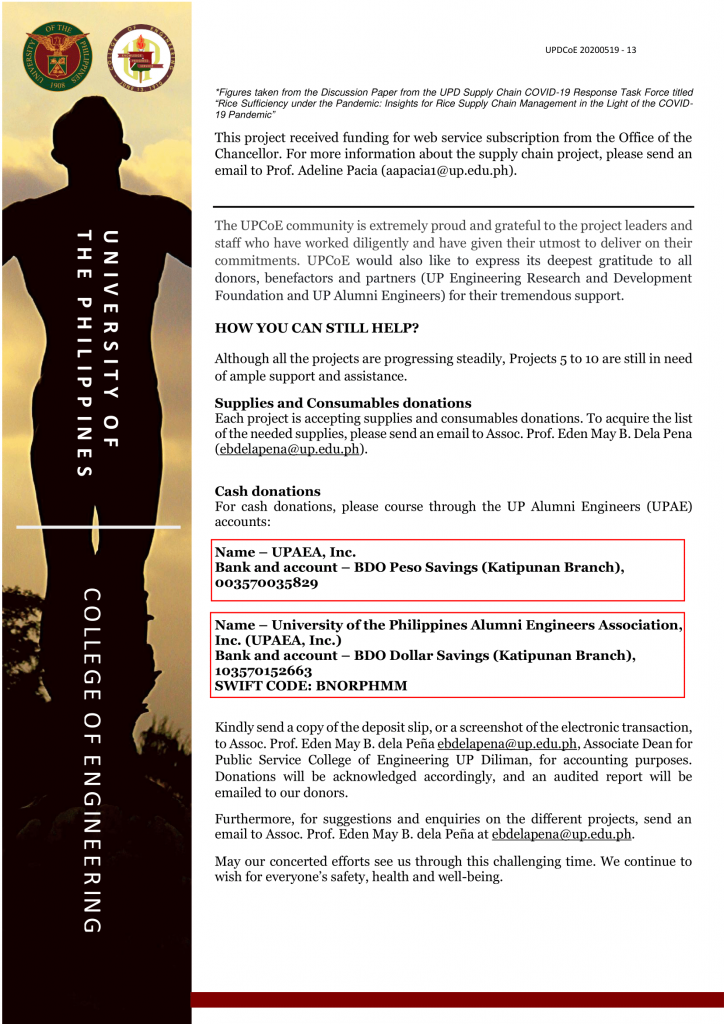
May 19, 2020
ENGINEERING SOLUTIONS TO FIGHT THE THREAT OF COVID-19 UPDATES
The following presents the most recent updates on the UPCoE initiatives endorsed by the UPCoE COVID-19 Response Team (CRT) headed by Prof. Ferdinand G. Manegdeg (UPCoE Dean), together with Prof. Gerald Jo G. Denoga (Associate Dean for Research), Assoc. Prof. Carl Michael F. Odulio (Associate Dean for Administration), Assoc. Prof. Florencio C. Ballesteros, Jr. (Associate Dean for Instruction), Asst. Prof. Juvy A. Balbarona (Associate Dean for Student Affairs), Prof. Manolo G. Mena (NGSE Director), Assoc. Prof. Eligia D. Clemente (College Secretary) and Assoc. Prof. Eden May B. dela Peña (Associate Dean for Public Service) to help fight the threat of the COVID-19 pandemic.
PROJECT #1: 3D PRINTING SOLUTIONS FOR OUR FRONTLINERS
Project lead: Prof. Gerald Jo G. Denoga (UPDME)
Project team members: Asst. Prof. Mario Carreon (UPDCS) and Mr. Erik Lacson (Meta-Tech)
As of May 5, 2020, the project has fabricated two thousand eight hundred seventy-five face shield frames, assembled two thousand three hundred fourteen by volunteers from Acacia Residence Hall and Ilang-Ilang Residence Hall and distributed one thousand nine hundred forty eight to 39 hospitals and institutions.
PROJECT #2: PROTOTYPE ADULT VENTILATOR
Project lead: Asst. Prof. Paul L. Rogers (DME)
Project team members: Dr. Manuel V. Hernandez, Jr. (UPDME), Prof. Edwin N. Quiros (UPDME), Assoc. Prof. Carl Michael F. Odulio (UPEEEI), and Dr. Joel M. Santiaguel (UP PGH)
The assembly of solenoids, valves, piping, and a pressure gauge is completed while the casing is presently under fabrication/assembly. Pressure gauge and valves were calibrated and tested for different pressures and deemed to be functional within the operating range. Following the construction of the control and display system, the unit is ready for further tests. If initial tests are satisfactory, testing in the presence of pulmonologist, Dr. Joel Marquez Santiaguel will be scheduled for the following week.
PROJECT #3: TRACKING HIGH RISK INDIVIDUALS
Project lead: Prof. Ariel C. Blanco (UPDGE)
Project team members: Assoc. Prof. Rosalie B. Reyes (UPDGE), Asst. Prof. Czar Jakiri S. Sarmiento (UPDGE), Asst. Prof. Roseanne V. Ramos (UPDGE), Asst. Prof. Ransie Joy Apura (UPDGE) and Asst. Prof. Edgardo G. Macatulad (UPDGE)
ConTra+, the mobile app for contact tracing and more, is being tested. ConTra+ is a system utilizing satellite positioning systems, bluetooth technology, geographic information system, and citizen science for effective contact tracing, tracking, information sharing, and feedback.
Last May 11, 2020, a coordination meeting with the Quezon City Mayor’s Office, which expressed a great desire to adopt the project’s outputs, was held. The discussions revolved around the effective use and implementation of the project in the city. The project’s vulnerability maps can be used to identify areas where stricter enhanced community quarantine (ECQ) should be imposed and mass testing be prioritized.
TRACING FOR ALLOCATION OF MEDICAL SUPPLIES (TrAMS) PROJECT
The Tracing for Allocation of Medical Supplies (TrAMS) project is part of Project 3: Tracking High Risk Individuals. TrAMS is an online system composed of geographic and tracking information of hospital’s medical supplies. The project has two main components: (1) spatial database development and (2) web interface design and development. Spatial database development constitutes compilation and verification of geographic information from several sources such as existing databases from hospitals, from the academic community and from other parties, and social media posts. Web interface development involves identifying key features of the web application, storyboarding, database schema design, and implementation with the MERN technology stack.
Figure 1 and 2 shows the default web interface and the display for selection of hospitals and supply level identification.
Figure 1. Default web interface
Figure 2. Selection of hospitals and display of supply level.
The project’s interface has been deployed, as such government agencies, donors and other interested parties may use this system as a tool for effective response and distribution of the supplies.
The web app link can be accessed through:
https://trams-up-dge.herokuapp.com
or
PROJECT #4: DISINFECTION AND DECONTAMINATION THROUGH PLASMA CLEANING
Project lead: Assoc. Prof. Magdaleno R. Vasquez, Jr. (UPDMMME)
Project team members: Asst. Prof. Katrina Lois M. Taaca (UPDMMME) and Assoc. Prof. Eduardo R. Magdaluyo (UPDMMME)
The project is currently refurbishing a larger plasma chamber, and various essential components (e.g. flanges) are being fabricated. When completed, vacuum and plasma testing of the chamber will commence.
PROJECT #5: DISINFECTION OF PPE VIA UV LIGHT
Project lead: Prof. Florencio C. Ballesteros, Jr. (UPDChE) and Assoc. Prof. Eligia D. Clemente (UPDMMME)
Project team members: Prof. Ferdinand G. Manegdeg (UPDME), Prof. Annaliza P. Rollon (UPEnE) and Dr. Louernie de Sales-Papa (UPEnE)
The first two prototypes, P1 and P2, have been completed. P1 and P2 are closet types meant to disinfect lab gowns (4 to 6 pcs) and masks (8 to 12). These were initially sent to IB-CS and UPCM-PGH for validation and were found to be 100% efficient in eradicating bacteria after 40 minutes exposure. These early prototypes have been delivered to UP PGH and East Avenue Medical Center.
The UP PGH further requested another disinfection unit suitable for treating coveralls, since health workers are now required to wear coveralls rather than lab gowns.
PROJECT #6: ChlorGen: ON-SITE HYPOCHLORITE DISINFECTANT GENERATION VIA BRINE WATER ELECTROLYSIS
Project lead: Assoc. Prof. Joey D. Ocon (UPDChE)
Project team members: Asst. Prof. Julie Anne D. del Rosario (UPDChE), Asst. Prof. Miguel M. Remolona (UPDChE), Asst. Prof. Allan Yago (UPIC), Instr. Marlon L. Mopon Jr. (UPDChE) and Instr. Paul Jake B. Nalzaro (UPDChE)
The ChlorGen team has already assembled the electrochemical chamber using a set of special electrodes that lasts longer than typical metal (e.g. steel) electrodes. Different components and parts of the chamber are being purchased while performing optimization runs of the process and quantitative analysis are in progress.
PROJECT #7: DESIGN AND PROTOTYPING OF A POWERED AIR-PURIFYING RESPIRATOR
The Powered Air-Purifying Respirator is a ventilation device that provides positive air pressure within the mask and with air filtered through an N95 inline filter. In this project, two teams (7A and 7B) are involved in producing separate designs and associated prototype models.
Project lead (7A): Prof. Paul Rodgers (DME)
Project team members: Prof. Louis Angelo Danao (DME) and Dr. Francis Palencia (Argonix Medical Corporation)
A mechanical air fan takes ambient air and courses it through the medical ventilation tubing, the inline N95 filter, then to the CPAP mask. An additional N95 filter may be fitted at the intake side of the air fan to assure that the intake air is thoroughly clean. This device will provide filtered air to the user at positive pressure, reducing the chances of inhaling virus-contaminated air.
The design optimization of the respirator prototype is still ongoing. This prototype uses a motor rated at 100W with an estimated battery life of 1.5 hours. The team is awaiting the delivery of the full face gear that is to be assembled with the other components.
Project lead (7B): Prof. Gerald Jo C. Denoga (DME)
Project team members: Engr. Ralph S. Jose (UPDME Alumnus), Instr. Gaudan Albert Chekov Castillo (EEEI), Asst. Prof. Juvy A. Balbarona (DME), Asst. Prof. Samiel Louie Arrojado (DME), Instr. Jose Ygnacio Jesus A. Macaspac V (DME) and Dr. Nathaniel W. Yang (UPCM)
The filter is expected to exceed the efficiency and effectivity of N95 masks. The respirator prototype has been completed and awaiting assessment feedback from the UP College of Medicine.
PROJECT #8: REVITALIZATION OF NON-FUNCTIONING UP-PGH VENTILATOR SYSTEMS
Project lead: Asst. Prof. Samiel Louie Arrojado (DME)
Project team members: Prof. Gerald Jo C. Denoga (DME), Prof. Ferdinand G. Manegdeg (DME) and Assoc. Prof. Carl Michael F. Odulio (EEEI)
Nine (9) non-functioning ventilators were brought to the UP Department of Mechanical Engineering for assessment. The project team has finished their assessments and concluded on the difficulty of conducting repairs on these machines at UP. The team will provide recommendations on the appropriate repair service providers and parts suppliers to the UP-PGH for their further action.
PROJECT #9: IDENTIFICATION OF POTENTIAL DRUG CANDIDATES FOR THE SARS-COV-2 USING STRUCTURE BASED DRUG DISCOVERY
Project lead: Assoc. Prof. Arthur A. Gonzales III (UPDChE)
Project team member: Asst. Prof. Miguel M. Remolona (UPDChE), Dr. Joven Q. Tanchuco (UPCM), and Dr. Leslie Michelle M. Dalmacio (UPCM)
Twenty five (25) ns molecular dynamics (MD) simulations have been run using the top ten compounds from the docking results. Protein-ligand complex stability and interactions have been determined quantitatively (see results for Compound #10 below). Results indicate a good fit between the top candidates and protease. Individual visual inspection of the simulation results is the next task at hand. This will be followed by adsorption, distribution, metabolism, excretion, and toxicity evaluation using open source servers. Then a final recommendation based on the initial 1200 compounds can be made. The machine learning model is now being developed using the docking results. This could lead to the accelerated screening of 100,000 compounds in the future.
RMSD of Protease-Compound #10 complex indicates a stable interaction.
Residues interacting with Compound #10. There are good contacts between the ligand and residues ASN142, SER144, HIS163, and GLU166.
A collaboration meeting was held last May 4, 2020 with the UP College of Medicine (UPCM) regarding the direction of the project. The UPCoE team will proceed with molecular docking simulations and machine learning activities to short list small molecules that could potentially work against the SARS-COV-2 protease. Meanwhile, the UPCM team will be responsible for identifying the actual effects of these small molecules on the SARS-COV-2 protease.
PROJECT #10: TOOL KIT FOR QUICK ESTIMATION OF COVID-19 INFECTIVES
Project lead: Assoc. Prof. Vena Pearl A. Bongolan (UPDCS)
Project team members: Mr. Jose Marie Antonio Minoza (UPDCS), Dr. Jesus Emmanuel Sevilleja, M.D. (UP Manila) and Dr. Romulo J. de Castro (Balik scientist, DOST)
On April 20, 2020, the project proposed two new models: the (i) Age-Stratified Q-SEIR, which was immediately used to update the advisory for Quezon City regarding preparedness; and (ii) the Non-Linear Infection model, which shows the benefits of quarantine even beyond its lifting, as influenced by different factors such as people behavior and quality of testing procedures. Currently, the team is writing scientific reports on the new models. A coordination meeting was held last May 11, 2020 with the Quezon City Mayor’s Office on the possible implementation of this tool kit project.
Additional three (3) projects were included as a response of the UPCoE community to fight the COVoD-19 pandemic.
PROJECT#11: PROTOTYPE ADULT VENTILATOR
Project lead: Engr. Ramon Publico (DME Alumnus)
Project team member: Dr. Joselito Chavez (UPCM)
Another design of adult ventilator prototype is being created by this team. This ventilator system is also quick to produce and are cost-effective alternatives to commercially-available ones. The fabrication of one compressed air box unit arrived from Singapore; however, minor design issues are being addressed. The electronic components and accessories from Japan are scheduled for delivery. The 3D printed adaptors were received from Dr. Gerald Jo Denoga and waiting for another set from the MIRDC’s Advanced Manufacturing Centre. The assembly of the unit will commence once the components have been delivered. The schematic diagram of the ventilator system is shown in the image below.
PROJECT#12: ieHEALS (INTEGRATED EMERGENCY HEALTHCARE SYSTEM)
Project Leads: Assoc. Prof. Mili-Ann M. Tamayao-Kieke (UPDIEOR), Prof. Aura C. Matias(UPDIEOR) and Prof. Lowell L. Lorenzo (UPDIEOR)
Project Team Members: Prof. Eugene Rex L. Jalao (UPDIEOR), Asst. Prof. Lorelie G. Jalao (UPDIEOR), Asst. Prof. Raymond Freth Lagria (UPDIEOR), Asst. Prof. Simon Anthony Lorenzo (UPDIEOR), Instr. Carlo Angelo Sonday (UPDIEOR), Instr. Pierre Allan Villena (UPDIEOR), Instr. Lizabeth Ann Franco (UPDIEOR), Instr. Nikole Andrei Louise Mallare (UPDIEOR), Instr. Regine Tejada (UPDIEOR) and UPDIEOR Student Volunteers
ieHEALS is an integrated personnel, material, and information system for managing critical hospital operations in an emergency setting. It was developed and deployed to the UP Philippine General Hospital (UP PGH) and Cagayan Valley Medical Center (CVMC) as featured in the UPdate site of the University (https://upd.edu.ph/ecq-extended-upd-marches-on-weve-got-your-back-part-4/ ).
Currently, ieHEALS is providing UP PGH with a donation and inventory information system with two components – Internal MIS and public dashboard for donations tracking.
PGH Inventory Management System and Donations Tracker
(Public Report Dashboard: https://pghinvdashboard.herokuapp.com/)
An appointment system and teleconsultation platform call Telekonsulta was developed. This platform also includes patient, healthcare worker, and material flow planning recommendations. Additionally, ieHEALS provided the Donation Inventory System CVMC.
Online appointment system.
For more information about ieHEALS, please send an email to Assoc. Prof. Mili-ann Tamayao-Kieke (mmtamayao@up.edu.ph).
PROJECT# 13: UP SUPPLY CHAIN COVID-19 RESPONSE TASK FORCE
Project Leads: Prof. Adeline A. Pacia (UPDIEOR) and Dr. Aura C. Matias (UPDIEOR)
Project Team Members: Prof. Francisco N. de los Reyes (School of Statistics), Prof. Manuel Leonard F. Albis (School of Statistics), Prof. Peter Julian A. Cayton (School of Statistics) , Prof. Charlene Mae Y. Celoso (School of Statistics), Prof. Jan Gil G. Sarmiento (School of Statistics), Prof. Stephen Jun V. Villejo (School of Statistics), Prof. Johnrob Y. Bantang (College of Science), Prof. Erwin A. Alampay (National College of Public Administration and Governance), Prof. Ranjit S. Rye (College of Social Science and Philosophy), Prof. Agustin L. Arcenas (School of Economics), Dr. Eugene Rex L .Jalao (UPDIEOR), Prof. Iris Ann G. Martinez (UPDIEOR) , Asst. Prof. Lorelie G. Jalao (UPDIEOR), Asst. Prof. Erickson L. Llaguno (UPDIEOR), Asst. Prof. Simon Anthony Lorenzo (UPDIEOR) and UPDIEOR Student Volunteers
Several members of the DIEOR faculty have also been involved as members of the UPD Supply Chain Covid-19 Response Task Force, a committee constituted by UP Diliman through Administrative Order No. FRN-20-030 dated April 20, 2020. The UP Diliman Supply Chain Covid-19 Response Task Force was constituted to address the supply chain issues of food and essential goods brought about by the Covid-19 pandemic. The scope of work covers the following:
- Collaborating with the different government agencies in the collection and storage of data into a common resource pool thru the UP Diliman Computation Science Research Center (CSRS).
- Addressing the Supply Chain issues of food and essential goods brought about by the COVID-19 pandemic thru faculty from the Department of Industrial Engineering and Operations Research and the School of Statistics by: (a) developing the Supply Chain Models for the identified food and essential goods such as rice, corn, root crops, noodles, meat, fish, seafood, fruits, vegetables, oils/fats, drinking water, bread/cereals, milk/cheese/eggs, salt, coffee, soap and detergents and providing data on the Supply and Demand Gap Analysis
- Crafting policy recommendations resulting from the Supply Chain Studies for submission to DTI and BOI.
Total Regional Projected Rice Production (pre-COVID-19 Scenario) with Quarterly Components (in MT), Philippines 2020.*
Clustered Bar Chart of Projected Rice Production Versus Estimated Demand in MT.*
*Figures taken from the Discussion Paper from the UPD Supply Chain COVID-19 Response Task Force titled “Rice Sufficiency under the Pandemic: Insights for Rice Supply Chain Management in the Light of the COVID- 19 Pandemic”
This project received funding for web service subscription from the Office of the Chancellor. For more information about the supply chain project, please send an email to Prof. Adeline Pacia (aapacia1@up.edu.ph).
The UPCoE community is extremely proud and grateful to the project leaders and staff who have worked diligently and have given their utmost to deliver on their commitments. UPCoE would also like to express its deepest gratitude to all donors, benefactors and partners (UP Engineering Research and Development Foundation and UP Alumni Engineers) for their tremendous support.
HOW YOU CAN STILL HELP?
Although all the projects are progressing steadily, Projects 5 to 10 are still in need of ample support and assistance.
Supplies and Consumables donations
Each project is accepting supplies and consumables donations. To acquire the list of the needed supplies, please send an email to Assoc. Prof. Eden May B. Dela Pena (ebdelapena@up.edu.ph).
Cash donations
For cash donations, please course through the UP Alumni Engineers (UPAE) accounts:
Name – UPAEA, Inc.
Bank and account – BDO Peso Savings (Katipunan Branch), 003570035829
Name – University of the Philippines Alumni Engineers Association, Inc. (UPAEA, Inc.)
Bank and account – BDO Dollar Savings (Katipunan Branch), 103570152663
SWIFT CODE: BNORPHMM
Kindly send a copy of the deposit slip, or a screenshot of the electronic transaction, to Assoc. Prof. Eden May B. dela Peña ebdelapena@up.edu.ph, Associate Dean for Public Service College of Engineering UP Diliman, for accounting purposes. Donations will be acknowledged accordingly, and an audited report will be emailed to our donors.
Furthermore, for suggestions and enquiries on the different projects, send an email to Assoc. Prof. Eden May B. dela Peña at ebdelapena@up.edu.ph.
May our concerted efforts see us through this challenging time. We continue to wish for everyone’s safety, health and well-being.

